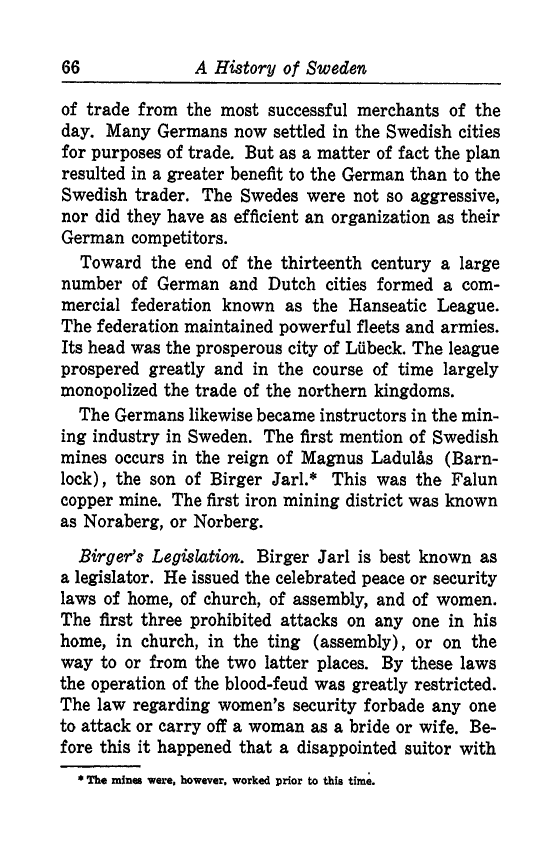
Full resolution (TIFF) - On this page / på denna sida - V. Later Catholic Period in Sweden - A. The Regency of Birger Jarl

<< prev. page << föreg. sida << >> nästa sida >> next page >>
Below is the raw OCR text
from the above scanned image.
Do you see an error? Proofread the page now!
Här nedan syns maskintolkade texten från faksimilbilden ovan.
Ser du något fel? Korrekturläs sidan nu!
This page has never been proofread. / Denna sida har aldrig korrekturlästs.
66 A History of Sweden
of trade from the most successful merchants of the
day. Many Germans now settled in the Swedish cities
for purposes of trade. But as a matter of fact the plan
resulted in a greater benefit to the German than to the
Swedish trader. The Swedes were not so aggressive,
nor did they have as efficient an organization as their
German competitors.
Toward the end of the thirteenth century a large
number of German and Dutch cities formed a com-
mercial federation known as the Hanseatic League.
The federation maintained powerful fleets and armies.
Its head was the prosperous city of Liibeck. The league
prospered greatly and in the course of time largely
monopolized the trade of the northern kingdoms.
The Germans likewise became instructors in the min-
ing industry in Sweden. The first mention of Swedish
mines occurs in the reign of Magnus Ladulas (Barn-
lock), the son of Birger JarL* This was the Falun
copper mine. The first iron mining district was known
as Noraberg, or Norberg.
Birger’s Legislation. Birger Jarl is best known as
a legislator. He issued the celebrated peace or security
laws of home, of church, of assembly, and of women.
The first three prohibited attacks on any one in his
home, in church, in the ting (assembly), or on the
way to or from the two latter places. By these laws
the operation of the blood-feud was greatly restricted.
The law regarding women’s security forbade any one
to attack or carry off a woman as a bride or wife. Be-
fore this it happened that a disappointed suitor with
* The mines were, however, worked prior to this time.
<< prev. page << föreg. sida << >> nästa sida >> next page >>